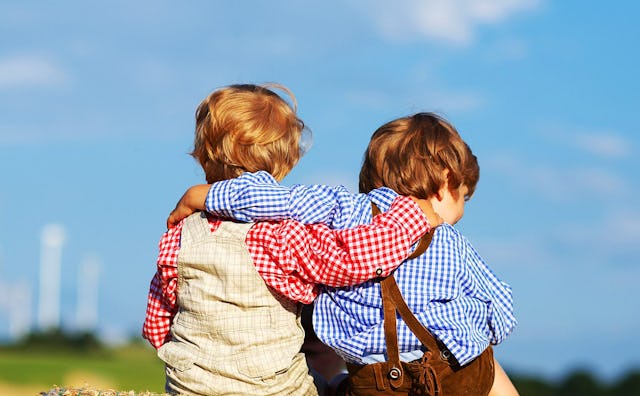All That Need: My First Six Years With Twins

My boys came out healthy, huge and, thank God, they slept a lot (at first). With my C-section wound still zinging, we hosted Sam’s Finding Nemo birthday party at my sister’s house the day after the twins and I were released from the hospital. My son’s life was about to change forever with the addition of two more mouths to feed, two more children’s cries to answer and two more bodies standing between him and every scrap of attention he could fight for; I wasn’t about to take away his birthday party, too.
We moved three days after that hurdle. We had lots of help the first two months, from my wonderful in-laws, my mom and my sister, Bridgitte. When the last of our help left, I felt like getting down on my hands and knees and clutching their pant legs to get them to stay. Nothing could prepare us for the huge responsibility of caring for two newborns at the same time, all alone.
My husband, always hands-on and ever the workhorse, shared all the nighttime shifts with me, since the twins were bottle-fed. The babies, as we called them then, cried whenever they were not being held. This meant that we “wore” them, as much as we could, in Baby Bjorns. I spent (threw away) money on dual baby carriers that were supposed to work with one baby in the front, one in the back, and I tried to put them in slings on both of my sides. That arrangement never lasted longer than 10 to 15 minutes before my back began to feel much like that of an arthritic 85-year-old woman.
Todd and I got used to eating our dinners while each wearing a baby in a Baby Bjorn—we would put a dishcloth over the top of each twin’s head so we didn’t drip spaghetti sauce or salad dressing on them as we wolfed down our meal.
© Courtesy Ashley Allen
Some days, especially when they were a bit older and crying, crying, crying to be held at the same time, when my arms just weren’t strong enough anymore, I would lie down on the floor and cry with them, letting them crawl over me, because I was not willing to choose one to hold and comfort over the other. On those days, I dreamed of running away. I looked longingly down the street, stopping halfway up our stairs to peer out the bay window, and I imagined myself opening it, jumping down gingerly like a cat and scampering away. (Although I probably would’ve broken every bone in my body and gone nowhere but the hospital, being in traction at that time sounded like a nice, breezy vacation). I wouldn’t have done any of that—couldn’t have—but I did fantasize about escaping all that need.
When they turned 2, the twins needed me less, and they needed dangerous freedom more. They ran in two separate directions, never one little duckling following the other (the way I heard other twins did). Fiercely independent and proudly different, they were determined to challenge themselves to find equally “exciting” but opposite paths. I quickly lost the baby weight that year.
Things got easier at 3 and 4. They started to be interested in staying in one spot for longer than 30 seconds. Toys held their attention; TV shows did too. (Thank you, Wonder Pets. Not only did you save all those animals in trouble—you saved my sanity. And all you wanted for babysitting payment was a single stalk of celery.) I still had to watch them on high-alert though—don’t get me wrong—and I had to potty train them! Good God. I still have nightmares about finding the trail of turds, Hansel and Gretel-style, that would follow them and their Thomas the Train underpants wherever they went.
Now all of that’s behind us, so to speak. At the age of six, they can be semi-trusted to wipe their own butts, wash their own hands, clean up their own messes and play on their own, and it helps me tremendously that they like each other’s company. They go off and play Legos, or Pokemon cards, or Wii or the Blue Bear Game (which involves throwing Blue Bear back and forth across their bedroom. I’m convinced this is why Blue Bear keeps running away and getting lost).
Drew is my sweet, athletic, loving, rule-following, sensitive boy, who idolizes his older brother Sam and his Daddy. Zach is my distracted, quirky comedian, whose zany one-liners keep our whole family in stitches and who puts me to shame with his dance moves.
They both still need me, of course they do, but they need others too—other family members, friends, teachers, adults. My role will always be that of their mother, and they will always need me—just in new ways, ways I don’t even know about yet. But they will never again need me with that physical, visceral, instinctual dependency they had when they were babies. I didn’t think I would ever say this, but I’m going to miss all that need.
This article was originally published on